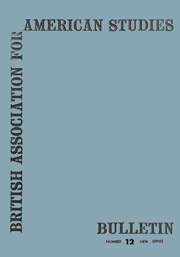No CrossRef data available.
Article contents
Welsh Emigration to the United States
Published online by Cambridge University Press: 17 February 2011
Extract
There is a story told in Wales of a certain John Jones, a stalwart of the local choir, who died and arrived up above just in time for a Heavenly Choir practice. He immediately took his place and, looking around, found that there were a thousand tenors, a thousand sopranos and a thousand contraltos but only himself in the bass. Nothing daunted, he gave of his best in the opening chorus until suddenly the Heavenly Conductor rapped on the podium and turning to John Jones, said, “Not quite ao loud in the bass, please, Mr. Jones”. It has been much the same in the field of emigration; for every John Jones who went to America, whole choirs of other nationalities flooded in, and, with a few exceptions, subsequent narrators of the story of the Welsh in America, have sung, on both sides of the Atlantic, very loudly in the bass. The quality of the Welsh contribution to the United States as against the quantity of that contribution has been bolstered by filio-pietistic writers who have claimed for the Welsh nation, Roger Williams (who was not a Welshman), many of the signers of the Declaration of Independence, Jefferson, Lincoln, Robert E. Lee, Jefferson Davies, John L. Lewis and Frank Lloyd Wright among many hundreds of other “eminent Welshmen”. Possibly the high water mark of such claims has been that of the discovery of America by Prince Madoc in the twelfth century, and the legend of the Welsh-speaking Welsh Indians, which was taken up again with great zeal in the nineteenth century and has lingered on to the present day despite the researches of Thomas Stephens which have reduced the claim to that of a romantic legend.
- Type
- Research Article
- Information
- Copyright
- Copyright © British Association for American Studies 1959


